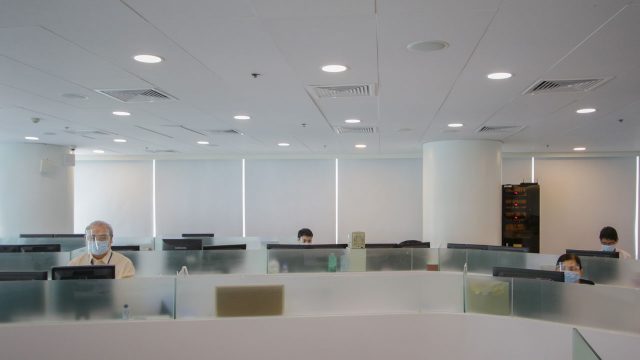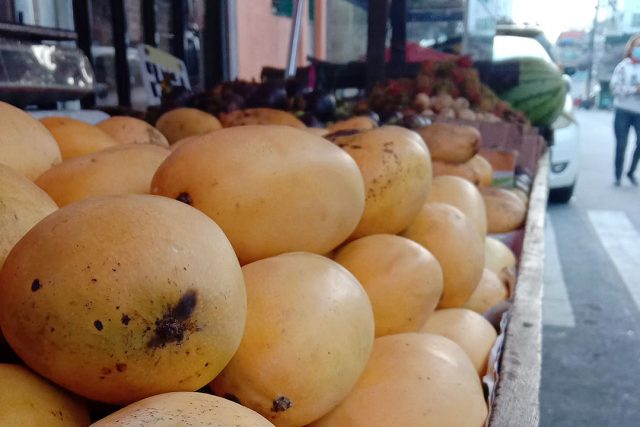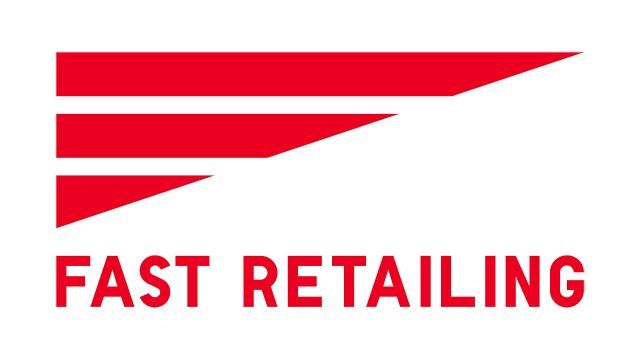Saving the Earth one retaso at a time
By Joseph L. Garcia, Reporter
A FILIPINA designer has made it to British Vogue using the power of fabric scraps.
Rio Estuar is the designer behind RIOTaso, a brand that advocates sustainable lifestyles through making clothes out of fabric scraps. She will be on the magazine’s Designer Profile page for its Jan. 2022 issue, which dropped on Dec. 10. A snippet from Ms. Estuar’s Facebook page read: “A fiercely Filipina sustainable brand that repurposes fabric scraps into new textiles and creates one-of-one designs which cannot be replicated.”
“British Vogue reached out and hand selected RIOtaso as a brand they would like to give a feature spot to on the Designer Profile page…,” Ms. Estuar told BusinessWorld in an interview. “I seized the opportunity as a way to get RIOtaso as well as local, small, and sustainable fashion on an international level. I tapped fellow local brands who also create sustainably to be part of the photoshoot so that more brands can be recognized on an international level.”
RECYLING LEFTOVERS
The brand’s name is a combination of her own name and the Filipino word for fabric scraps (retaso). Ms. Estuar’s scraps come from her days as a fashion student. “I never threw away any of the scraps I accumulated throughout college life and the many clothing line attempts I had. Not because I was a conscious climate justice warrior up in arms against the fast-fashion industry, but simply because I am a hoarder,” she said on her website.
Hasn’t her hoard run out by now? “Some of those supplies are still with me today, four years later,” she said. “That’s how much fabric we used up as students. After college, I tried to reach out to brands and partner up with them as the person who would make sure their scraps wouldn’’ go to waste — this was initially ignored, partly because I think brands are very secretive and this might expose how much waste they produce?
“I am simply proposing a solution to the waste. So instead, I would source outside factories, and at one point, I was able to bring home four rice sacks full of perfectly good fabric waiting to be picked up and trashed. Nowadays brands are more transparent and often reach out to me with their excess fabric. I use only 100% fabric waste and turn them into new textile.”
Ms. Estuar transforms scraps from fabric that would not have reached their full potential and imbues them with new life through care and creativity. Both suits and separates (and even accessories like hats) are released by RIOtaso, and she explains how they’re made. She sorts the scraps by thinking about what she has a lot of at the moment, and what kind of clothing she can make out of them, keeping in mind “comfort, practicality, and pockets.”
“I have always had an idea for color combos as I have been painting since I was five years old and my favorite thing to do is mix colors on a palette to see what colors make up what and which colors go together in an interesting way.”
The scraps are worked in through patchwork to create the base, after which a pattern is created, then sewn. “I don’t have a factory as that would mean I mass produce. I just have my simple home studio plus storage space for all the fabric scraps I save and restore.”
SISTERLY INSPIRATION
Her journey started in 2015, a story detailed on her website (riotaso.com). The brand started when, according to her website, her “sister started to take home trash” (she was collecting plastic waste from her classmates to assemble eco-bricks at home). This started her sister’s journey to becoming vegan and living more sustainably by planting food and composting.
“Though she may be younger than me, her radical change in lifestyle strongly influenced what was to come,” Ms. Estuar said on her website.
At that time, she was working on a streetwear brand of her own called Kalye Rio, which she closed down in 2018. “The brand grew to be a great creative and commercial success, but behind the seams I slowly grew disillusioned with the amount of fabric waste my business was involved in. I had my very own ‘fashion-is-a-crime’ breakdown, withdrew myself from the city, and moved to a small beach town community where I learnt to live sustainably. Through routine beach cleanups, I saw firsthand the negative impact of plastic waste on the environment and the community, to the point that it was no longer a cute or trendy weekend activity,” she said on her website. As for the very detailed brand story on her website, she said, “Transparency is key when advocating for sustainability.”
“I struggled with myself and learned how to live as sustainably as I could (I’m still in the process of learning now), but I greatly missed creating clothes and working with fabrics. I moved back to the city and sorted through the fabric scraps I left behind and decided to incorporate the zero-waste lifestyle into a brand-new fashion line. I found inner peace as I stitched each fabric scrap together and challenged myself to only use fabric waste from then on.”
SUSTAINABLE FASHION
We’ve taken a hard, long look at our own lifestyles during this pandemic, and Ms. Estuar has done the same. She makes her own observations on the pandemic changing how we look at sustainable consumption. “The pandemic hit a lot of people really hard financially, and I noticed a rising argument on social media about how sustainable fashion is elitist. People would question the pricing of small sustainable brands and would compare it with the better value/bargain they would get from a fast fashion brand. And they’ve got a point — you do get more bang for your buck from a fast fashion company.
“But it comes at the cost of supporting a brand with unethical labor practices and environmental abuse. However, I don’t think anyone should be shamed for buying or owning fast fashion pieces. Instead, I advocate that the most sustainable act is not to buy more clothing — but to take care of the clothes you already own, and learn how to mend and repair your existing clothing whether it’s from Zara or RIOtaso.”
Clothing that ticks many boxes on sustainability checklists holds its appeal for consumers who advocate for lifestyles that are better for the environment. “Looking at how one consumes is definitely a good sign that our cause to slow down and create consciously is working. It is important for consumers to take a step back and assess before purchasing anything. I’m not sure if I’ve actually converted any lifestyles radically. However, I do meet a lot of individuals on social media who are trying to live a more eco-friendly lifestyle.”
ONE OF A KIND
The late Vogue editor-in-chief and fashion icon Diana Vreeland once said, “You’re not supposed to give people what they want, you’re supposed to give them what they don’t know that they want yet.” Ms. Estuar’s own vision for sustainability does not just cover the desire to live better for others, but a baser desire among followers of fashion: the need to own something that is only truly theirs. By its nature, no RIOtaso piece will ever be completely the same, and each piece from Ms. Estuar’s hands will be the only one in the world.
“The reason behind the one-offs is simple: I can’t repeat a patchwork pattern twice! That keeps each item I make unique, especially when it’s custom-made because the customer gets to choose which colors they want me to create with,” she said.
“Another reason why my pieces are unique is because I mostly take in custom orders to cater to the measurements of the client and that is one of the reasons people shop RIOtaso. RIOtaso is size inclusive and unique.”
As big brands switch more and more to sustainable textiles and practices (this year, Hermès released a bag made of fungi textile that mimics leather), it seems that being more careful with what we consume is fast becoming the fashion. “Designers who actually care about the consumers and the environment are the future of fashion,” said Ms. Estuar.
On a grim note, she adds, “That’s if there’s still a future to look forward to considering the climate crisis.”
Ms. Estuar’s is one of many start-up brands hoping to make a difference in the environment and in the consumer mindset. However, the battle for a more sustainable Earth cannot be won without cooperation and compromise with giant brands. “All big fast fashion businesses grew through the exploitation of workers and the environment. I’m not sure if compromising on whether to pollute a river with a bit less fabric dye will solve any problems. I think that if a big company wished to be more sustainable, bold and radical changes would have to be made.” said Ms. Estuar.
Shop RIOtaso at https://www.instagram.com/riotasoclothing/.















